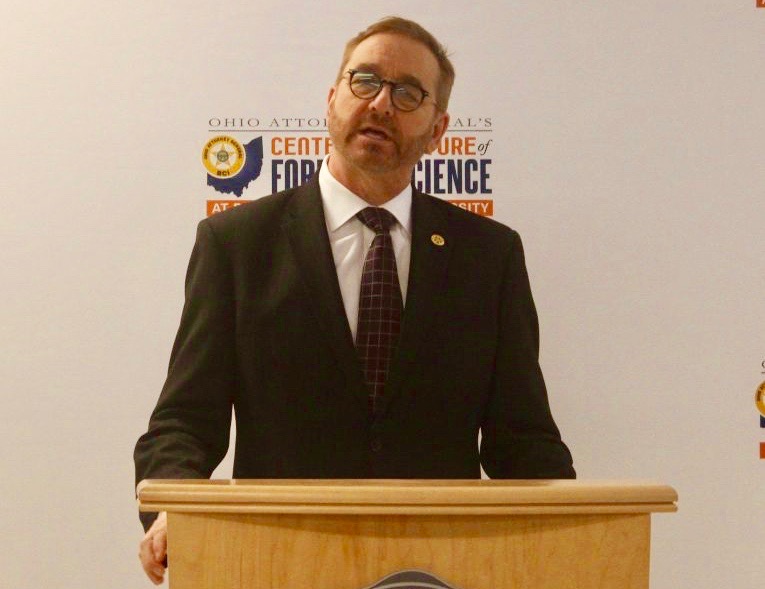BY: SUSAN TEBBEN
Joining 19 other state attorneys general, Ohio’s Dave Yost has jumped in on a lawsuit demanding that sexual orientation and gender identity not be included in discrimination protections.
The complaint, filed in U.S. District Court for the Eastern District of Tennessee, argues “administrative agencies,” in this case the Biden administration, don’t have the power to change laws, but also challenges a recent U.S. Supreme Court ruling saying employers could not fire employees based on their sexual orientation or gender identity.
“This case is not about the wisdom of the administration’s policy,” Yost said in a statement. “It is about power.”
State Sen. Nickie Antonio, D-Lakewood, sent a letter to Yost on Tuesday expressing her disappointment in his decision.
“It is the Attorney General’s duty as the state’s chief legal officer to protect our children and families, not to attack and malign hardworking Ohioans who happen to be from the LGBTQ community,” Antonio said in a statement.
LGBTQ policy organization Equality Ohio said the state should be more focused on economic recovery than on lawsuits “fighting for the right to discriminate.”
“AG Yost’s decision to participate in this misguided lawsuit against LGBTQ+ people pushes Ohio down the wrong path,” said Maria Bruno, public policy director for Equality Ohio.
The Biden administration directed federal agencies through an executive order to review existing regulations, policies, and other directives for consistency with the U.S. Supreme Court decision.
The lawsuit accuses the U.S. Department of Education and the Equal Employment Opportunity Commission of “flouting procedural requirements in their rush to overreach” by interpreting federal antidiscrimination law “far beyond what the statutory text, regulatory requirements, judicial precedent and the Constitution permit.”
The attorneys general said guidance from the DOE and EEOC “concerns issues of enormous importance to the states,” according to court documents.
“The guidance purports to resolve highly controversial and localized issues such as whether employers and schools may maintain sex-separated showers and locker rooms, whether schools must allow biological males (transgender females) to compete on female athletic teams and whether individuals may be compelled to use another person’s preferred pronouns,” the lawsuit states.
With regard to the Supreme Court decision, the states say the court “narrowly held” that terminating an employee for being LGBTQ constituted sex discrimination, and the court “declined to consider whether employer conduct other than terminating an employee simply because the employee is homosexual or transgender — for example, ‘sex-segregated bathrooms, locker rooms and dress codes’” — would constitute discrimination.
The states of Tennessee, Alabama, Alaska, Arizona, Arkansas, Georgia, Idaho, Indiana, Kansas, Kentucky, Louisiana, Mississippi, Missouri, Montana, Nebraska, Oklahoma, South Carolina, South Dakota and West Virginia are also represented in the lawsuit.
Ohio’s legislature has brought its own movements — or lack thereof — on LGBTQ issues in the past few years. In June, the Ohio House pushed through a ban on transgender female athletes competing on the side that matches their gender identity. The Senate later rejected the addition, but the bill targeting the same goal remains up for consideration.
A bill to add sexual orientation and gender identity to protected classes in the state, the Ohio Fairness Act, has been introduced multiple times, and has not made it past committee hearings.
***
Also from Ohio Capital Journal:
Already concerned with drug costs, large employers, family pharmacists worry about more middlemen
POINT PLEASANT, W.V. — There already were deep concerns among small pharmacists about drug middlemen known as “pharmacy benefit managers.”
Now the corporations that own them appear to be creating yet another layer of middlemen. That has even the largest employers in the country worried.
The operators of a regional chain of pharmacies based in this town along the Ohio River have long complained that the reimbursements they receive from the powerful middlemen are strangling their ability to stay in business.
Especially in the Appalachian hills of Southeastern Ohio and in the rolling hills to the north in Amish country, low payments by middlemen through the state Medicaid program have already driven many community pharmacies out of business and threaten many more, the businesses say.
Some of them believe the new middlemen who are being added will only make things worse. READ MORE
Ohio House Health Committee chair doesn’t want leadership listening to hospitals during pandemic
Ohio House Health Committee Chair Scott Lipps said in a May text the last thing he and his allies need is for House Speaker Bob Cupp or the rest of the Republican majority leadership to be listening to hospitals — during a pandemic now in its fourth wave that has killed 20,866 Ohioans.
The Statehouse News Bureau reports that Lipps, a Republican from Franklin, was texting with state Rep. Jennifer Gross, R-West Chester, about House Bill 248, Gross’ proposal to eliminate all vaccine mandates for all vaccines. READ MORE
Commentary: Court ruling dismisses science, jeopardizes Ohioans’ health
A Butler County judge ignored scientific evidence and proven patient care when he ordered West Chester Hospital to treat a seriously ill COVID-19 patient with the livestock deworming drug ivermectin. This drug, which has been proven safe and effective for treating head lice and other parasitic infections in humans, has come under intense scrutiny as it is being promoted among some as the latest COVID-19 miracle treatment. It isn’t. Ivermectin is scientifically unproven as a treatment or as a preventative measure for COVID-19.
As members of the Infectious Diseases Society of Ohio, which represents infectious diseases physicians on the front lines of Ohio’s pandemic response, we’ve seen far too much pain in communities across our state during the last year and half. We are working around the clock to prevent additional suffering and loss of life and ensure everyone we treat gets the best care, supporting the best possible outcome. That is why it is absolutely essential to the health of Ohio and the nation that all COVID-19 therapies be adequately studied and that data supporting their use be evaluated in a factual, transparent manner. READ MORE





